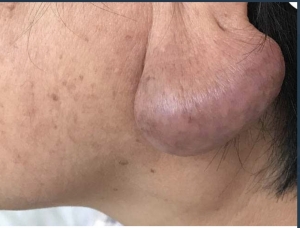Kimura disease
Kimura disease is a rare autoimmune disorder that causes lymphadenopathy, a condition in which lymph nodes become enlarged. It is caused by an abnormal immune response to a viral infection, which results in the production of autoantibodies that attack healthy tissue. It is characterized by subdermal lymphoid masses present in the neck and head. Symptoms of Kimura disease include fever, fatigue, and swollen lymph nodes. Diagnosis is made by physical examination, biopsy, blood tests, and imaging.
Treatment of Kimura disease typically involves a combination of corticosteroids and immunosuppressants, which help to reduce the swelling of the lymph nodes and suppress the autoimmune response. In some cases, surgery may be needed to remove the enlarged nodes. Other treatments may involve lifestyle changes, such as a healthy diet and regular exercise.
Kimura disease is a rare autoimmune disorder that can be managed with proper medical care. It is important to seek medical attention if you experience any of the symptoms of Kimura disease. Early diagnosis and treatment can help reduce the risk of complications and improve your overall health.
Written by: Naif Alalshaikh, medical student
References:
DermNet

